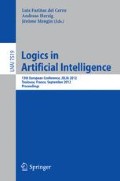Abstract
The question whether Dung’s abstract argumentation theory can be instantiated with classical propositional logic has drawn a considerable amount of attention among scientists in recent years. It was shown by Cayrol in 1995 that if direct undercut is used, then stable extensions of an argumentation system correspond exactly to maximal (for set inclusion) consistent subsets of the knowledge base from which the argumentation system was constructed. Until now, no other correspondences were found between the extensions of an argumentation framework and its knowledge base (except if preferences are also given at the input of the system). This paper’s contribution is twofold. First, we identify four intuitive conditions describing a class of attack relations which return extensions corresponding exactly to the maximal (for set inclusion) consistent subsets of the knowledge base. Second, we show that if we relax those conditions, it is possible to instantiate Dung’s abstract argumentation theory with classical propositional logic and obtain a meaningful result which does not correspond to the maximal consistent subsets of the knowledge base used for constructing arguments. Indeed, we define a whole class of instantiations that return different results. Furthermore, we show that these instantiations are sound in the sense that they satisfy the postulates from argumentation literature (e.g. consistency, closure). In order to illustrate our results, we present one particular instantiation from this class, which is based on cardinalities of minimal inconsistent sets a formula belongs to.
SV was funded by the National Research Fund, Luxembourg. His work was carried out during the tenure of an ERCIM “Alain Bensoussan” Fellowship Programme. This Programme is supported by the Marie Curie Co-funding of Regional, National and International Programmes (COFUND) of the European Commission.
Access this chapter
Tax calculation will be finalised at checkout
Purchases are for personal use only
Preview
Unable to display preview. Download preview PDF.
References
Amgoud, L., Besnard, P.: Bridging the Gap between Abstract Argumentation Systems and Logic. In: Godo, L., Pugliese, A. (eds.) SUM 2009. LNCS, vol. 5785, pp. 12–27. Springer, Heidelberg (2009)
Amgoud, L., Vesic, S.: A new approach for preference-based argumentation frameworks. Annals of Mathematics and Artificial Intelligence (2011)
Amgoud, L., Vesic, S.: On the Equivalence of Logic-Based Argumentation Systems. In: Benferhat, S., Grant, J. (eds.) SUM 2011. LNCS, vol. 6929, pp. 123–136. Springer, Heidelberg (2011)
Baroni, P., Giacomin, M.: On principle-based evaluation of extension-based argumentation semantics. Artificial Intelligence Journal 171, 675–700 (2007)
Caminada, M., Amgoud, L.: On the evaluation of argumentation formalisms. Artificial Intelligence Journal 171(5-6), 286–310 (2007)
Cayrol, C.: On the relation between argumentation and non-monotonic coherence-based entailment. In: Proceedings of the 14th International Joint Conference on Artificial Intelligence (IJCAI 1995), pp. 1443–1448 (1995)
Dung, P.M.: On the acceptability of arguments and its fundamental role in nonmonotonic reasoning, logic programming and n-person games. Artificial Intelligence Journal 77, 321–357 (1995)
Gabbay, D., Pigozzi, G., Rodrigues, O.: Common foundations for belief revision, belief merging and voting. In: Formal Models of Belief Change in Rational Agents (Dagstuhl Seminar Proceedings) (2007)
Gorogiannis, N., Hunter, A.: Instantiating abstract argumentation with classical logic arguments: Postulates and properties. Artificial Intelligence Journal 175, 1479–1497 (2011)
Hunter, A., Konieczny, S.: On the measure of conflicts: Shapley inconsistency values. Artificial Intelligence Journal 174(14), 1007–1026 (2010)
Priest, G.: Paraconsistent logic. In: Gabbay, D., Guenthner, F. (eds.) Handbook of Philosophical Logic, vol. 6, pp. 287–393. Kluwer Academic Publishers, Dordrecht (2002)
Shapley, L.: A value for n-person games. In: Contributions to the Theory of Games II, pp. 307–317. Princeton University Press (1953)
Author information
Authors and Affiliations
Editor information
Editors and Affiliations
Rights and permissions
Copyright information
© 2012 Springer-Verlag Berlin Heidelberg
About this paper
Cite this paper
Vesic, S., van der Torre, L. (2012). Beyond Maxi-Consistent Argumentation Operators. In: del Cerro, L.F., Herzig, A., Mengin, J. (eds) Logics in Artificial Intelligence. JELIA 2012. Lecture Notes in Computer Science(), vol 7519. Springer, Berlin, Heidelberg. https://doi.org/10.1007/978-3-642-33353-8_33
Download citation
DOI: https://doi.org/10.1007/978-3-642-33353-8_33
Publisher Name: Springer, Berlin, Heidelberg
Print ISBN: 978-3-642-33352-1
Online ISBN: 978-3-642-33353-8
eBook Packages: Computer ScienceComputer Science (R0)

